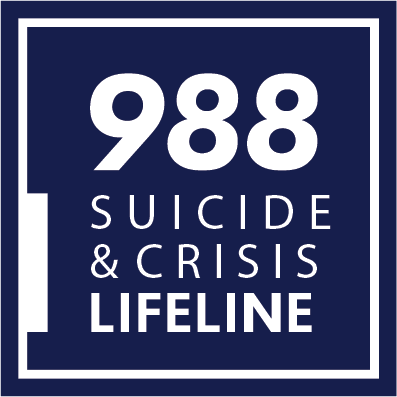Main Content
If you are having suicidal thoughts
- Get help by calling the free and confidential Suicide Prevention Hotline at 1-800-273-8255 or 988.
- Stay connected in meaningful ways to the support people in your life and tell them how they can support you through this. Create a contact list of your support people and note the ways that each individual can best support you.
- Take precautions by identifying the source of the suicidal thoughts and triggers for the thoughts, reducing your access to lethal means (firearms, drugs, etc.), reducing your stress and engaging in self-care, and consider lifestyle changes to prevent suicide.
- Access counseling to treat thoughts of suicide and gain effective coping skills, such as Psychological and Wellness Services for current students.
Source: The Jed Foundation

Get Help Now
Call 1-800-273-8255 or call 988.
The Lifeline provides 24/7, free and confidential support for people in distress, prevention and crisis resources for you or your loved ones, and best practices for professionals in the United States. You can reach the free and confidential lifeline at 1-800-273-8255 (or by dialing 988 beginning July 16, 2022).
Options for those who are deaf, hard of hearing, or have hearing loss:
- Online chat
- For TTY Users: Use your preferred relay service or dial 711 then 1-800-273-8255
- Veterans Crisis Line
- If you are a Veteran or service member with hearing loss, or any person concerned about someone who is, there are several ways to contact the Veterans Crisis Line:
- Text with a Veterans Crisis Line responder – Send a text message to 838255
- Online chat with a Veterans Crisis Line responder
- If you are a Veteran or service member with hearing loss, or any person concerned about someone who is, there are several ways to contact the Veterans Crisis Line:
24/7 confidential crisis support for Veterans and their loved ones. You don’t have to be enrolled in VA benefits or health care to connect. Call 1-800-273-8255 and press 1, text 838255, or chat online.
Chat with, call, or text the Trevor Project. The Trevor Project is the world’s largest suicide prevention and crisis intervention organization for LGBTQ young people.
Operated by RAINN, call 800-656-4673 or use their live chat to get help 24/7 for sexual, interpersonal, and relationship violence.
Dial (800) 576-7764 or text "HEAL" to 741741 for non-life threatening but urgent behavioral health crisis support available for free, 24/7. Anyone can call the Crisis Line – for themselves, a family member or friend.
Chat with or call MySSP for free, confidential mental health support from licensed mental health therapists with experience supporting the unique challenges faced by college students. MySSP is available to all UWT current students, 24/7, and in multiple languages.
Risk & Protective Factors, and Warning Signs
While there is no single cause for suicide, suicide most often occurs when stressors combined with health concerns create feelings of hopelessness and despair. Knowing the risk and protective factors and warning signs of suicide can help us recognize when someone needs help.
Risk Factors
- Mental health conditions such as depression, substance use problems, bipolar disorder, schizophrenia, anxiety
- Childhood abuse, neglect, or trauma
- Family history of suicide
- Previous suicide attempts
- Access to lethal means including firearms and drugs
- Stressful events like loss of a loved one, financial crisis
- Prolonged stress
- Sexual assault
Protective Factors
- Access to mental health care
- Feeling connected to family and community support
- Problem solving and coping skills
- Limited access to lethal means
- Cultural and religious beliefs that encourage connecting and help-seeking, discourage suicidal behavior, or create a strong sense of purpose or self-esteem
Warning Signs
If a person talks about:
- Killing themselves
- Feeling hopeless
- Having no reason to live
- Being a burden to others
- Feeling trapped
- Unbearable pain
If a person’s behavior changes:
- Increased use of alcohol or drugs
- Looking for a way to end their lives, such as searching online for methods
- Withdrawing from activities
- Isolating from family and friends
- Sleeping too much or too little
- Visiting or calling people to say goodbye
- Giving away prized possessions
If a person displays one or more of the following moods:
- Depression
- Anxiety
- Loss of interest
- Irritability
- Humiliation/Shame
- Agitation/Anger
- Relief/Sudden Improvement
- Aggression and/or fatigue
Suicide Prevention at UW Tacoma
No institution can guarantee students will never attempt or complete suicide and no single prevention effort can best serve all students. At the UW Tacoma we implement many different strategies contributing to our overall suicide prevention program. The following are steps based on current research and best practice approaches.
- Psychological & Wellness Services are advertised to all incoming students via a brochure given to them as part of new student orientation.
- Trained mental health professionals in Psychological & Wellness Services (253-692-4522) are available at no additional charge to all students enrolled at UW Tacoma.
- Advanced training and supervision: Doctoral Psychology interns at PAWS receive specific advanced training and supervision in suicide assessment, intervention and documentation.
- Referral to professionals in the community is provided when off-campus treatment is preferred by a student, or when staff are not able to meet treatment needs.
Psychiatric evaluation and treatment is available off campus via referral from our licensed psychologist. CRISIS LINE: 1-800-576-7764
Campus Safety (253-692-4416 or 2-4416 from a campus phone) is on duty 24/7. Our Safety & Security staff can connect to other UW support staff, Tacoma Police, or Tacoma emergency services as needed.
If urgent transportation to a local hospital is needed, but an ambulance is not necessary, staff in Campus Safety, Psychological & Wellness Services, or the Student Affairs office can arrange for taxi service.
Reducing access to weapons is a proven approach to reducing suicides. Weapons are not allowed on our campus.
If a medical or mental health issue makes it impossible for a student to complete a quarter, they may petition to drop their classes. The Former Quarter Drop process provides students with a method to petition for a grade earned in a former quarter to be changed to a Registrar Drop (RD). A grade of RD does not impact your cumulative GPA or academic standing. A Former Quarter Drop (FQD) may be granted by your campus registration team if you are unable to complete or withdraw from your course(s) because of extenuating circumstances beyond your control. See the link to the Registrar's webpage
The UW Tacoma faculty have available to them information about mental health issues common in the college population and are frequently reminded about the support services available on campus. Periodic education and training in suicide awareness, prevention and referral skills is offered to faculty and staff of UW Tacoma.


